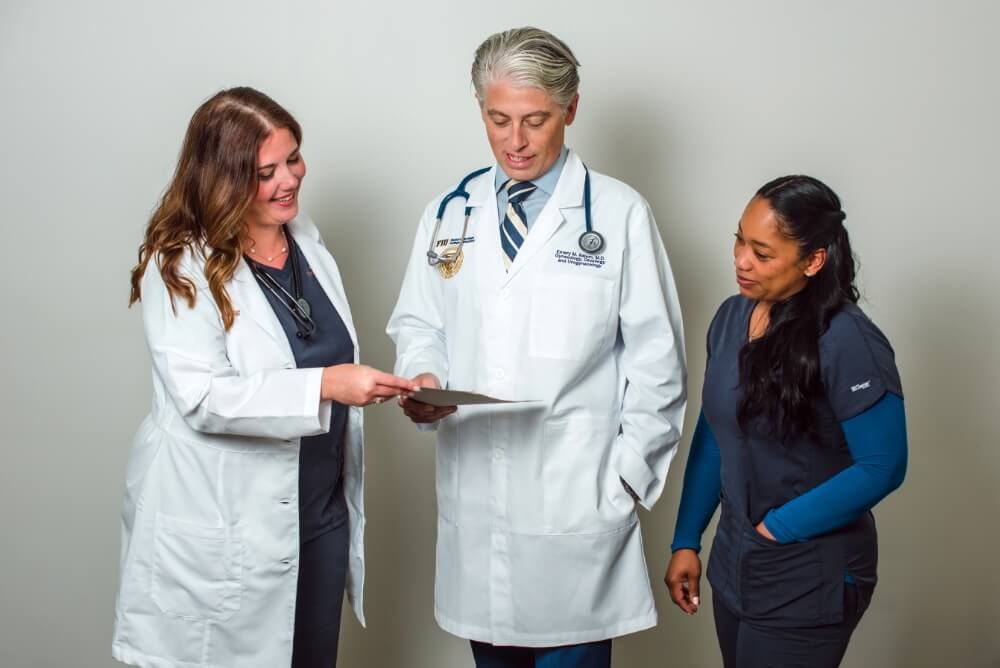Endometriosis Treatment in South Florida
Endometriosis is a benign disease characterized by endometrial tissue, similar to the tissue lining your uterus or womb, growing outside of your uterus or womb. Often found on your ovaries, fallopian tubes, tissue lining the pelvic organs, intestines, or distant organs, this tissue can cause most commonly pelvic pain, ranging from mild to severe, painful sexual intercourse, and infertility. Pain is often an indicator of endometriosis, a disease that affects about 200 million women worldwide, though the severity of the pain does not necessarily correlate to the extent of the condition.
What are the symptoms of Endometriosis?
The most common symptoms of endometriosis include:
- Painful menstrual cycles
- Pain during sexual intercourse
- Pain with bowel movements
- Abdominal bloating, cramping, diarrhea, and constipation
- Difficult or painful urination
- Infertility
The pelvic pain is also easily mistaken for other medical conditions such as ovarian cysts or pelvic inflammatory disease, and the abdominal symptoms can mimic IBS. It is painfully confusing.
How is endometriosis diagnosed?
Endometriosis can be challenging to diagnose. A pelvic exam may identify cysts on your reproductive organs, which can be a sign of endometriosis. Often an ultrasound is ordered to get an accurate view of your reproductive organs and to identify endometriomas, which are cysts associated with endometriosis. An MRI is often used in addition to the ultrasound to help detect deeper structures.
Because it can be hard to diagnose, it can take anywhere from 6 to 10 years for a woman to be diagnosed with endometriosis; many women are not diagnosed until their late 20s. In fact, a definitive diagnosis can only be made through laparoscopy, a minor medical procedure.

What are the treatment options for endometriosis?
While the cause of endometriosis is unknown and there is no cure, there are effective non-surgical and surgical treatments available.
We have personally seen the positive results in our practice and we are confident your quality of life will increase dramatically once you start treatment.
Non-Surgical Treatments for Endometriosis:
- As the first line of treatment for management of mild to moderate pain, we generally recommend over-the-counter nonsteroidal anti-inflammatory (NSAI) drugs such as Advil or Motrin.
- If the NSAIs are not controlling your pain or symptoms, we often prescribe birth control. Continuous use of birth control is often an effective way to control irritation and reduce the pain of endometriosis. The pills prevent endometrial cells from shedding, thereby reducing inflammation.
- Many of our patients have found success with the new oral prescription drug elagolix (Orilissa) which is the first drug developed specifically to treat moderate to severe pain from endometriosis and approved by the FDA. It has also been found to be beneficial in the treatment of painful intercourse.
Surgical Treatment for Endometriosis:
When oral medication is not effective in treating the symptoms of endometriosis, laparoscopic surgery is commonly recommended to diagnose and actually remove the endometrial tissues. While our goal is to avoid surgery, it is often the best way to help those suffering from endometriosis.
Endometriosis
and Infertility
Endometriosis does not automatically mean you will experience infertility. However, many patients with endometriosis do struggle to conceive. In our practice, we find that patients who have been diagnosed with stage 1 or 2 are less likely to experience infertility. So early intervention is extremely important.
What are the risk factors for
endometriosis?
The exact cause of endometriosis is unclear. Some suggest it is caused by retrograde menstruation, hematogenous spread, a faulty immune system, genetic factors, or local tissue conversion. While any woman may develop endometriosis, family history, short menstrual cycles, late menopause, high estrogen levels, and uterine abnormalities increase the risk for endometriosis. Contributing lifestyle factors include alcohol consumption and low body mass index.
Though endometriosis has no cure, we have
been successful in treating it.
Our doctors at The Center for Gynecologic Oncology specialize in diagnosing and treating endometriosis. We understand its complexities and how it can affect the quality of your life. Our goal is to listen and offer you the most up-to-date treatments and the best possible outcomes.


